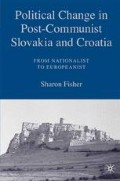Abstract
This chapter studies the emergence of “Nationalist” parties in Croatia and Slovakia and their entry into government through elections in 1990 and 1992, respectively. After putting the elections in their historical contexts (chiefly, the political maneuverings and interethnic tensions in Yugoslavia and Czechoslovakia), the chapter looks at the founding of the HDZ and HZDS and the discourse they used during their first election campaigns, particularly concerning the concept of the nation and the nation’s prospects for full development. In doing so, it focuses on three major questions: how “Nationalist” elite groups emerged, how certain policies and strategies affected the formation or persistence of such groups, and how elites managed to mobilize the population on the basis of national interests. Given that the victory of parties other than the HDZ and HZDS could have drastically changed the Croatian and Slovak nations’ future prospects, it is especially important to determine the major points of conflict between these two parties and their competitors. Moreover, the interaction between the political elite and the popular political culture is another key point of analysis: politicians must be sensitive to national traditions and to the prevailing public mood. Were elites consciously manipulating the masses, or were they simply responding to pressure from grass-roots nationalist movements?
Access this chapter
Tax calculation will be finalised at checkout
Purchases are for personal use only
Preview
Unable to display preview. Download preview PDF.
Notes
Renata Salecl, “The Crisis of Identity and the Struggle for New Hegemony in the Former Yugoslavia,” in The Making of Political Identities, ed. Ernesto Laclau (London: Verso, 1994), 225.
See Ivo Banac, The National Question in Yugoslavia: Origins, History, Politics (Ithaca, NY: Cornell University Press, 1984).
David Short, “The Use and Abuse of the Language Argument in the Mid-Nineteenth-Century ‘Czechoslovakism’: An Appraisal of a Propaganda Milestone,” in The Literature of Nationalism: Essays on East European Identity, ed. Robert B. Pynsent (New York: St. Martin’s Press, 1996), 40–65.
For more on Slovakia’s national awakening, see Robert B. Pynsent, Questions of Identity: Czech and Slovak Ideas of Nationality and Personality (London: Central European University Press, 1994).
There has been considerable controversy over that figure, with Tudjman arguing in a book published in the 1980s that only 60,000 were killed in all of Croatia. See Laura Silber and Allan Little, The Death of Yugoslavia, rev. ed. (London: Penguin and BBC, 1996), 85.
Josef Tomes, Slovnik k politickym dejinam Ceskoslovenska 1918–1992 (Prague: Nakladatelstvi Budka, 1994), 273.
Jan Buncak, Valentina Harmadyova, and Zuzana Kusa, Politicka zmena v spolocenskej rozprave (Bratislava: Veda, 1996), 80–81.
See Matica Hrvatska, Declaracija o nazivu I polozaju hrvatskog knjizevnog jezika: 1967–1997 (Zagreb: Hrvatska matica hrvatska, 1997).
Barbara Jelavich, History of the Balkans: Twentieth Century (Cambridge: Cambridge University Press, 1983), 396–397.
Milan Andrejevich, “Croatia: The ‘Silent’ Republic Speaks Out,” Radio Free Europe/Radio Liberty Situation Report, 26 May 1989a.
See Sona Szomolanyi, “Old Elites in the New Slovak State and Their Current Transformations,” in The Slovak Path of Transition—To Democracy? ed. Sona Szomolanyi and Grigorij Meseznikov (Bratislava: Slovak Political Science Association & Interlingua, 1994), 65.
Zrinjka Perussko Culek, “The Frameworks of Freedom, or What’s Wrong with Croatian Media Policy” in Relapse into Communism? The Media and Socio-Political Consciousness in Central and Eastern Europe, ed. David Paletz and Karol Jakubowicz (Cresskill, NJ: Hampton Press, 1998).
See Darko Hudelist, Banket u Hrvatskoj (Zagreb: Centar za informacije i publicitet, 1991), 217–223.
See HDZ, Spomen knjiga: Deset godina Hrvatske demokratske zajednice (Zagreb: HDZ, 1999), 34–43;
Marian Lesko, Meciar a Meciarizmus: Politik bez skrupul, politika bez zabran (Bratislava: VMV, 1996), 11–21;
Karol Wolf, Podruhe a naposled aneb Mirove deleni Ceskoslovenska (Prague: G plus G, 1998), 127–128.
See D. Djuric, B. Munjin, and S. Spanovic, Stranke u Hrvatskoj (Zagreb: NIRO, 1990), 59–62. This book contains key documents from the HDZ and other parties running in the 1990 elections.
Marko Mioc, Hrvatska demokratska zajednica u Koprivnici 1990–1993 (Koprivnica: HDZ, 1997), 18.
Jan Carnogursky, Videne od Dunaja (Bratislava: Kalligram, 1997), 115–116.
Rudolf Schuster, Ultimatum (Kosice: PressPrint, 1996);
Jergus Ferko, Hviezdna chvila Slovenska (Bratislava: Merkury, 1998), 295–296.
Milan Sutovec, Semioza ako politikum alebo “Pomlckova vojna” (Bratislava: Kalligram, 1999).
Dusan Slobodnik, Proti sedemhlavemu drakovi: Z dejin zapasu za Slovensko (Bratislava: Vydavatelstvo spolku slovenskych spisovatelov, 1998), 26–28.
Fedor Gal, Z prvej ruky (Bratislava: Archa, 1991), 73–76.
For background, see Jan Kacala, “Spisovna slovencina po r. 1989 a po vzniku samostatnej Slovenskej republiky,” in Statny jazyk v suvislostiach (Bratislava: Ministry of Culture, 1998), 73–74.
Frantisek Miklosko, Cas stretnuti (Bratislava: Kalligram, 1996), 128–130.
See Jan Obrman, “Language Law Stirs Controversy in Slovakia,” Report on Eastern Europe 1, no. 46 (1990): 16.
Stanislav Bajanik, “Co predchadzalo schvaleniu zakona o statnom jazyku?” in Tri roky Matice slovenskej 1993–1995, ed. Cyril Zuffa and Ladislav Paska (Martin: Matica slovenska, 1996), 240. See also Jergus Ferko (1998), 297.
Jan Kacala, Slovencina—vec politicka? (Martin: Matica slovenska, 1994), 54; and Kacala (1998), 73.
Lubos Kubin, Marian Velsic, Robert Dano, Bohumil Juhas, Igor Stupnan, and Daniel Balko, Dva roky politickej slobody—ex post (Bratislava: RaPaMaN, 1993), 79–95.
Zdravko Gavran, Aako su rusili Tudmana (Zagreb: Domovina TT, 1992), 30.
Ivan Grdesic, “1990 Elections in Croatia,” Croatian Political Science Review 1, no. 1 (1992): 95.
Drazen Lalic, “Pohod na glasace,” in Pohod na glasace: Izbori u Hrvatskoj 1990–1993, ed. Srdjan Vrcan, Drazen Lalic, Zoran Pokrovac, Nenad Bulat, and Damir Strelov (Split: PULS, 1995), 247.
Jan Jirak and Otakar Soltys, “Videoklipy,” in Volby, ed. Josef Alan, Fedor Gal et al. (Prague: EGEM, 1993), 78–79.
Jan Svejnar and Katherine Terrell, “Explaining Unemployment Dynamics in the Czech and Slovak Republics” (working paper, CERGE-EI, Prague, 1994).
Copyright information
© 2006 Sharon Fisher
About this chapter
Cite this chapter
Fisher, S. (2006). The First Elections—1990 in Croatia and 1992 in Slovakia. In: Political Change in Post-Communist Slovakia and Croatia: From Nationalist to Europeanist. Palgrave Macmillan, New York. https://doi.org/10.1057/9780230600881_2
Download citation
DOI: https://doi.org/10.1057/9780230600881_2
Publisher Name: Palgrave Macmillan, New York
Print ISBN: 978-1-349-53410-4
Online ISBN: 978-0-230-60088-1
eBook Packages: Palgrave Political & Intern. Studies CollectionPolitical Science and International Studies (R0)

